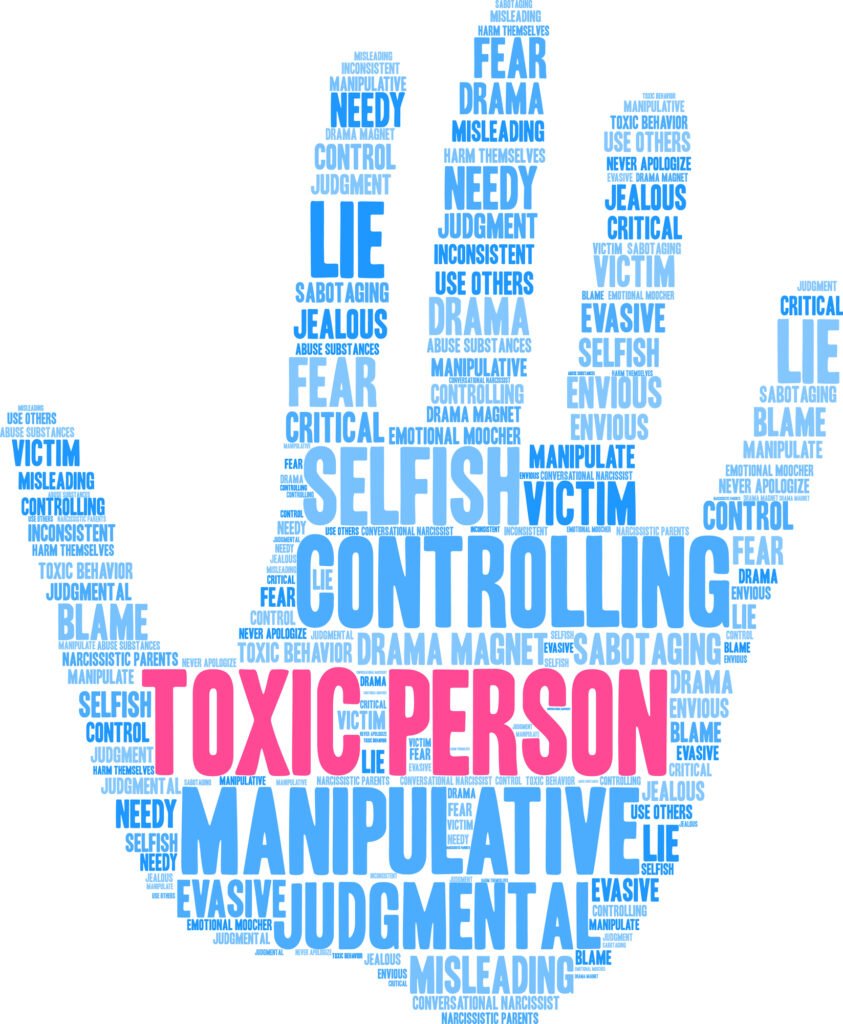Article has been updated July 2023
Relationships are the bedrock of our social existence, deeply influencing our mental and emotional well-being. While many individuals uplift and inspire us, there are some whose interactions can be draining and detrimental. Recognizing a toxic person is crucial in safeguarding one’s peace, energy, and overall well-being.
But how do we identify them?
Is it their consistent negativity, their knack for manipulation, or their inability to appreciate boundaries?
In this blog post, we delve into 11 distinct characteristics that define a toxic person, offering insights to help you discern and protect yourself from potential harm. By understanding these traits, we equip ourselves with the knowledge to navigate relationships more wisely.
What is a Toxic Person?
A toxic person is someone who has a negative impact on those around them. They may be manipulative, selfish, and lack empathy for others. Their behavior can range from subtle to overt, but the end result is always the same: you feel worse about yourself after spending time with them.
For example, a toxic person may be consistently critical of those around them, dominating conversations with their own opinions, or manipulating people to get what they want. They may also take advantage of others’ generosity and kindness without feeling any sense of remorse.
Although these individuals are certainly out there, the good news is that with a little bit of mindfulness, you can learn to recognize signs and know when to cut ties with a toxic person to maintain your own sense of wellbeing.
If you need extra support and tools from a licensed therapist, I recommend MMS's sponsor, BetterHelp, an online therapy platform that is both flexible and affordable. Get started today and take 10% off of your first month of therapy.
11 Characteristics That Define a Toxic Person
1. They always blame you for everything wrong
In any kind of relationship, you should never be completely blaming someone else for everything that goes wrong in your life. You have a partial fault in that scenario, but so do they. A toxic person is someone who holds you accountable for every fault in a scenario and the worst part is, you believe them too.
2. They never admit their mistakes
No matter what happens, they never admit that they were wrong and they never apologize for any of it. In the rare circumstances they apologize, it was to make you feel bad and to gain something from you. In reality, a toxic person never means their apology sincerely.
3. They disregard your boundaries
Boundaries are a sign of both respect and love so when someone disrespects your boundaries repeatedly, that isn’t someone you want to keep around. If they know you aren’t comfortable with something and yet they push you to do it, that’s an automatic red flag.

4. They are dishonest
While everyone tells white lies every now and then, a toxic person will make a habit out of lying to you straight in your face. You don’t need someone dishonest because trust, love, and respect are all interconnected and trust is the very foundation of any relationship.
5. They play the victim
This is one of the defining factors of what makes someone toxic in your life. Even if it’s their fault, they
will never be accountable for their actions instead, they’ll play the victim in the story so that you end up feeling bad for them instead. That’s what a toxic person can do in your life.
6. They invalidate your feelings
While your feelings and thoughts aren’t always valid, your partner or friend should make you feel heard and understood even just a little bit. When they make you feel your feelings don’t matter but theirs do, this is a huge red flag.
7. They don’t listen to you
You know someone is toxic when they only care about their needs above yours. Any relationship or friendship is about that mutual understanding that you get from them.
8. They are harsh towards others
When someone is kind towards you but is harsh towards others, they aren’t showing their genuine selves towards you. In fact, they may be masking their real personality for your sake. This is both toxic and manipulative, especially towards the receiving end of their behavior.
9. They make you question your sanity
Since they don’t make you feel appreciated or understood, they make you question everything regarding your sanity. You start to feel like you’re losing yourself in that friendship or relationship.
10. They are inconsistent
Inconsistent people are bad for your mental health, especially when they’re your romantic partner. One minute they’re into you and the next, they don’t want anything to do with you.
11. They are selfish
If you’re happy, then it means they should rain over your parade and can’t let the spotlight be on you, not even for just a second. Toxic individuals are the most selfish and arrogant people you’ll ever meet, thinking that the world revolves around just them.

Traits of a Toxic Person
- They drain every ounce of your energy and effort without giving back anything in return.
- They bring out your worst
- They control and manipulate you into their favor of things
- They aren’t good for your mental health
- They gaslight you intentionally
- They leave a trace of trauma and abuse that you can’t come back from
- They are selfish, narcissistic, and arrogant
- They only pretend to care about you to earn your trust
- They can’t stand the idea of you being better than them
- They invalidate your feelings and emotions
Final Thoughts
I hope this article was able to shed insight into everything you needed to know about toxic people. It’s easy to spot a toxic person as long as you know how to spot red flags when you see them. If you think someone is toxic, cut them off as early as you can before they gain control over you and you can no longer walk away.
Toxic people drain and exhaust you and no matter how bad you feel, you shouldn’t have to tolerate them. You deserve so much more than toxicity and to have that trauma and manipulation in your life.
Enjoy a 14-day free trial below.
FAQ
1. What is the purpose of this blog post?
This post aims to educate readers about the specific traits and behaviors commonly found in individuals who might be considered “toxic” in interpersonal relationships. By understanding these characteristics, readers can better navigate and protect themselves from potentially harmful relationships.
2. Does having one of these characteristics automatically make someone toxic?
No, a single trait does not necessarily define someone as toxic. However, a combination of these traits, especially if they persistently manifest in interactions, might indicate a pattern of toxic behavior.
3. Are these characteristics based on scientific research?
While the list is informed by various psychological studies and expert opinions, it’s essential to understand that the term “toxic” is subjective. Different people might have varying thresholds for what they consider toxic behavior.
4. Can a toxic person change their ways?
Yes, with self-awareness, therapy, and a genuine desire to change, individuals can alter their behavior. However, the willingness to recognize and address their toxic traits is crucial.
5. How can I approach someone I believe exhibits these toxic characteristics?
Approaching someone you believe to be toxic requires caution, empathy, and clear boundaries. It might be beneficial to seek advice from a therapist or counselor before addressing the individual.
6. Is it possible that I might have some of these toxic traits?
Self-reflection is a part of growth. If you recognize some of these characteristics within yourself, it’s an opportunity for introspection and self-improvement. Seeking professional guidance can also be helpful.
7. How do I protect myself from toxic individuals?
Setting clear boundaries, seeking support from loved ones, and possibly limiting or cutting off contact are some strategies to consider. It’s essential to prioritize your well-being.
8. Are there resources available for people who feel they are in a relationship with a toxic person?
Yes, numerous support groups, helplines, and therapists specialize in helping individuals navigate and recover from relationships with toxic individuals.
9. Can toxic individuals be found in professional settings as well?
Absolutely. Toxicity isn’t limited to personal relationships. It can manifest in workplaces, social circles, and other group settings.
10. How can I share my personal experiences with toxic individuals in a safe environment?
Consider joining support groups, online forums with strict moderation policies, or seeking therapeutic spaces where you can share and process your experiences in a safe and supportive environment.




